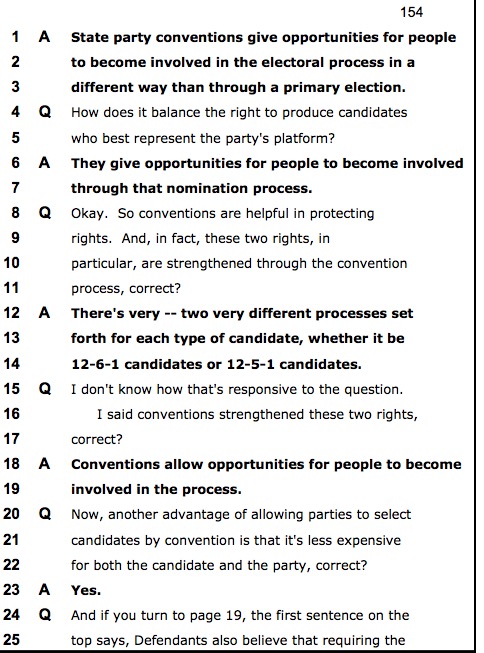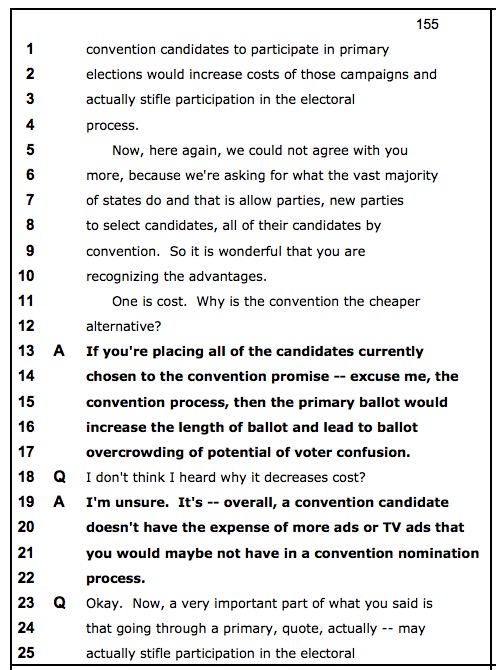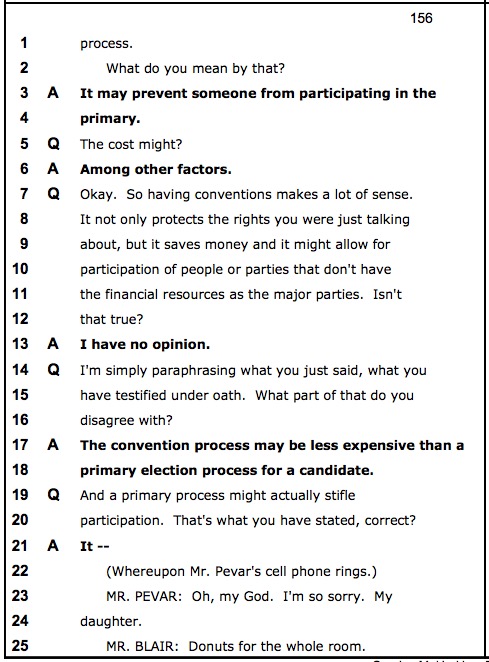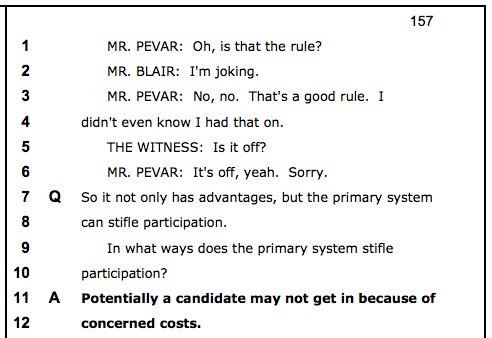In June 2016, U.S. District Court Judge Karen Schreier allowed a lawsuit by South Dakota’s Libertarian and Constitution parties to proceed, saying that late-March petition deadline those parties are challenging is “particularly oppressive” to third-party candidates. Today, attorneys for the plaintiff filed a motion for summary judgment, saying the state has refuted none of the material facts supporting the plaintiffs’ claim that late-March petition deadlines, along with our curious division of statewide candidates into primary and convention nominees, violate the Constitution.
The plaintiffs filed the following documents in federal court today:
- Motion for summary judgment
- Brief in support of motion
- Statement of undisputed material facts
- Exhibit 1: South Dakota Secretary of State 2016 ballot access pamphlet
- Ex. 2: SDSOS 2016 election calendar
- Ex. 3: Deposition of SOS Shantel Krebs, 2017.05.03
- Ex. 4: Deposition of Deputy SOS Kea Warne, 2017.05.03
One key argument in the plaintiff’s brief is that “the best chance of getting people to sign a petition or donate funds to support a new political party is in the months after the major parties have chosen their candidates” [p. 15]. The brief cites precedent for that contention in court rulings that have struck down similar early filing deadlines.
The plaintiffs argue further that South Dakota cannot require any political party, new or established, to select its candidates via primary:
In New York State Board of Elections v. Lopez Torres, 552 U.S. 196, 202 (2008), the Court recognized that “[a] political party has a First Amendment right . . . to choose a candidate selection process that will in its view produce the nominee who best represents its political platform.” Other decisions similarly support the First Amendment right of political parties to regulate their own affairs. In Eu v. San Francisco County Democratic Committee, 489 U.S. 214 (1989), the Court held unanimously that a state cannot tell political parties how to structure themselves, where to hold their state conventions, or order them to rotate their party chairs every two years because such laws “burden the First Amendment rights of political parties and their members without serving a compelling state interest.” Id. at 233. See also Cousins v. Wigoda, 419 U.S. 477, 491 (1975) (holding that states generally lack the authority to instruct political parties on how to resolve intra-party disputes regarding the seating of delegates); Democratic Party of U.S. v. Wisconsin ex rel. La Follette, 450 U.S. 107, 126 (1981) (holding that a state generally lacks the authority to require political parties to select candidates by a particular primary process created by the state) [Libs v. Krebs, brief, 2017.07.27, p. 16].
Woven through the plaintiffs’ brief are their deposition of Secretary Krebs, who was doggedly unresponsive during her May 3 encounter with plaintiffs’ attorney Stephen Pevar of the ACLU. When she could be coaxed away from her repetitious assertions that she only does what state law tells her to do, she admitted that she has never looked into how South Dakota’s ballot access laws compare to those of other states and can posit no compelling interest the state may have in imposing greater burdens than other states on new political parties’ ballot access.
Secretary Krebs’s weak deposition responses apparently characterize the state’s responses in court:
…in Defendants’ previous briefs, Defendants sought to justify their unusually high signature requirement by listing the State’s general interests in regulating the ballot. What they neglected to do, however, is explain how those general interests “actually require” such a high signature requirement for South Dakota. All states have those same interests, but South Dakota has responded by enacting an unusually draconian restriction. Unless Defendants can explain what is so different about South Dakota that only such drastic means will suffice, the Court must conclude that Defendants have failed to satisfy their burden of proof [plaintiffs’ brief, p. 20].
One remedy the plaintiffs seek to the burdensome early deadline is to allow parties to nominate all of their candidates, from Congress and Governor on down to Legislature, at their conventions instead of through primaries. While reading back arguments made by Krebs herself and her fellow defendants, Pevar got Krebs to acknowledge that letting parties skip primaries and nominate all candidates at convention could increase participation:
SOS Krebs says we have to have a late-March deadline for nominating petitions from political party candidates because she has to have time to print their names on the early June primary ballot. But SOS Krebs herself can’t enunciate a compelling reason to require a seemingly arbitrary class of candidates participate in the primary instead of seeking their nominations from their parties at the traditional summer conventions.




I observed the deposition of Ms. Krebs in May. She appeared to take the lawsuit against SoDak’s restrictions to alternative party access to the ballot as a personal affront. I suppose it’s possible that she is so enamored of partyline rhetoric and philosophy that she was personally offended.
I was somewhat surprised by her abject ignorance of the history of alternative parties (alternatives, that is, to Democrats and Republicans). On the other hand, she served as a Republican in the SoDak House of Reps, which has been known to do strange things to folks’ minds.
I imagine Ms. Krebs viewed it almost as if she had birthed these rules, and did take them as a personal affront, Bob. And I have been told she is very enamored, indeed, of her own rhetoric and maybe even a bit vain. I have seen her wear spiffy hats to back up that last sentence.
Let’s do it, Bob! Let’s run for Governor together under the Libertarian banner! A couple of people talked about it at breakfast last week but you were not listening at that moment, but we can do this. I just need a hat.
SMD, grudznick
One may be aware that sometimes filing motions protects folks from potential bar or ineffective assistance of counsel complaints. One should pay attention in the event a motion sticks.
From the statement of undisputed material facts:
From the brief in support of the motion:
Great post, Cory. Thanks for researching and covering this.
Bob, I see now what you reported in May about Krebs’s deportment during the deposition. On paper, she sounds belligerently non-responsive. She barricades herself behind statute and shows little interest in studying or addressing issues that practically affect voter participation and grassroots activism.
A Secretary of State should be the voters’ chief advocate, not a robotic slave of the Legislature’s efforts to protect the major two parties’ privilege.
Krebs history should be a good road map as to how she would serve in Washington. A NOem with different colored hair is what South Dakota voters could expect. Total disregard for South Dakota’s general well being or as some would describe, a looser. We saw last night just how much of a failure that is. Seems like we are waking up to the fact that they lie…often.
Read this article which appears to show that Krebs did give voter information to Kobach while he was Secretary of State of Kansas:
Wednesday, July 5, 2017
By Greg Palast for The Progressive
A national outcry followed last week’s request from Kris Kobach, Vice Chair of President Donald Trump’s Advisory Commission on Election Integrity, that state election officials provide him with a long list of personal information on every voter, including party affiliation, date of birth, last four digits of social security number, and more.
Many Republican states (red) indicated to CNN that they will “resist” Kris Kobach’s demand for full voter files—but have already given him those files. Four Democratic states (blue) have made the same inaccurate claim. North Carolina’s Democratic Governor last week ordered his Board of Elections not to hand over voter files to Kobach—but the Republican-controlled board had already turned over 6,745,639 voter files.
Election officials in forty-four states say they will refuse to comply with the June 28 written request from Kobach, whose advisory commission was created in May by Trump via executive order. Trump has made repeated and so-far unsubstantiated claims that millions voted illegally in the 2016 election.
“They can go jump in the Gulf of Mexico, and Mississippi is a great state to launch from,” responded Mississippi’s Republican Secretary of State Delbert Hosemann.
“The President’s Commission has quickly politicized its work by asking states for an incredible amount of voter data that I have, time and time again, refused to release,” said Louisiana’s Secretary of State Tom Schedler.
To the contrary, Schedler and voting officials from fifteen other Republican states, the majority of those allegedly “resisting” Kobach’s demand, have already shared detailed voter files with Kobach in his capacity as Secretary of State of Kansas.
Records obtained by The Progressive from the Kansas Secretary of State office showed that Schedler turned over nearly three million voter files to Kobach earlier this year, including voter birthdates and Social Security information.
In Mississippi, Hosemann turned over the state’s entire voter rolls to Kobach, some 2,092,886 files. Each file includes voter names, last four digits of their social security numbers, voting address, and voting history.
Kobach, who has recently announced his candidacy for Governor of Kansas, has indicated the lists will be used to remove illegal voters. But voting rights advocates say the goal is actually to allow fewer people to vote.
Twenty-one states listed by CNN as refusing Kobach his demands for voter files have already turned over voter files to Kobach’s office.
“The lists will almost certainly be used to…suppress the vote of citizens of color,” says Dee Hunter of the newly formed Civil Rights Center. Hunter’s group is part of a coalition including the ACLU, Common Cause, the NAACP of Georgia, Rev. Jesse Jackson of the Rainbow/PUSH Coalition, and other organizations calling for a halt to the expansion of Kobach’s Crosscheck system.
Voter lists from Mississippi, and twenty-seven other states, were turned over to Kobach beginning years ago as part of a voter-list purge program called “Interstate Crosscheck,” Hunter explains. The list aims to identify Americans registered in more than one state and intending to vote twice in one election, which is a crime. Any names identified as potential double-voters receives a postcard which, if unanswered, could lead to removal from the rolls.
According to a Rolling Stone analysis of data obtained from states participating in Interstate Crosscheck, as many as 1.1 million names were purged from voter rolls before the 2016 election.
According to database expert Mark Swedlund, an astonishing one in six Hispanics and one in nine African-Americans are on Kobach’s “potential double registered” list of seven million suspects in the twenty-eight states.
But Crosscheck functions by merely matching the first name and last name of voters in the 28 Crosscheck states. This screenshot of the Georgia-Virginia suspect list created by Kobach shows that Barbara ANN Jackson of Georgia is identified as potentially the same voter as Barbara FAYE Jackson of Virginia. Similarly, Billy RAY Jackson may be the same voter as Billy MANUEL Jackson JR.
Detail from Crosscheck results identifying potential “duplicate” voters in Virginia and Georgia.
The matches may seem ludicrous, but all these voters could lose their vote.
Swedlund calls Kobach’s approach a “simplistic, childish” matching algorithm. He says, “If your name is Jose Hernandez, you’re likely suspected of voting in 28 states!”
Indeed, in Virginia, at least 12 percent of voters on Kobach’s list lost their votes before the last election.
Virginia has purged tens of thousands of voters from the state’s rolls using the Crosscheck suspect list.
Before the election I spoke with Kobach at a Republican ice-cream social and asked him about Crosscheck potentially misidentifying voters as duplicate registrants. “Our system would not yield this match,” Kobach insisted. But when I showed him that Crosscheck contained literally millions of mis-matches, he jumped up, clutching his vanilla ice-cream—and ran for it.
He did call later to answer my questions, and stated he saw no problem in Crosscheck’s approach “to get the widest list possible” in the hunt for illegal voters.
***
Greg Palast (Rolling Stone, Guardian, BBC) is the author of The New York Times bestsellers, The Best Democracy Money Can Buy and Billionaires & Ballot Bandits, now out as major motion non-fiction movie.
Stay informed, rent or buy the film on Amazon or get the signed DVD, a signed copy of the book companion — or better still, get the Book & DVD combo.
Visit the Palast Investigative Fund store or simply make a tax-deductible contribution to keep our work alive! Alternatively, become a monthly contributor and automatically receive Palast’s new films and books when they’re released!
Or support the The Palast Investigative Fund (a project of The Sustainable Markets Foundation) by shopping with Amazon Smile. AmazonSmile will donate 0.5% of your purchases to the Palast Fund and you get a tax-deduction! More info.
Subscribe to Palast’s Newsletter. Follow Palast on Facebook and Twitter.
GregPalast.com
If Krebs did transfer data, it would suggest, as her deposition testimony does, that she’s not really interested in protecting South Dakota voter rights, at least not in any activist fashion. (Note also that the Crosscheck transfers appear to predate the Trump election fraud commission request.)
True, Cory. It would appear (if she did contribute to CrossCheck) she made another “mistake” and didn’t actually try to mislead the voters. Maybe someone should ask her about it.
I gave Ms. Krebs too much credit. Thought she had some integrity but what I have read here indicates a total lack of it. I agree with you, Jerry, in your comparison of Ms. Krebs with Ms. Noem. Pretty much neither give two cents for the rights or needs of their constituents!!
Krebs’s deposition certainly lacks any clear commitment to the principles of the SOS office. I am willing to entertain the possibility that her responses indicate not a Noem-like incompetence but a studious adherence to lawyer’s (attorney general’s) advice to stick to a script and give the plaintiffs as little ammo as possible in their suit against the state.
Of course, competence and integrity are not synonyms. One can be very, very good at putting self-interest and partisan interest over integrity and the general welfare.
You nailed it, Cory! But that’s why we follow Dakota Free Press! For the succinct and comprehensive analysis you provide. I will stand by my last sentence, however!